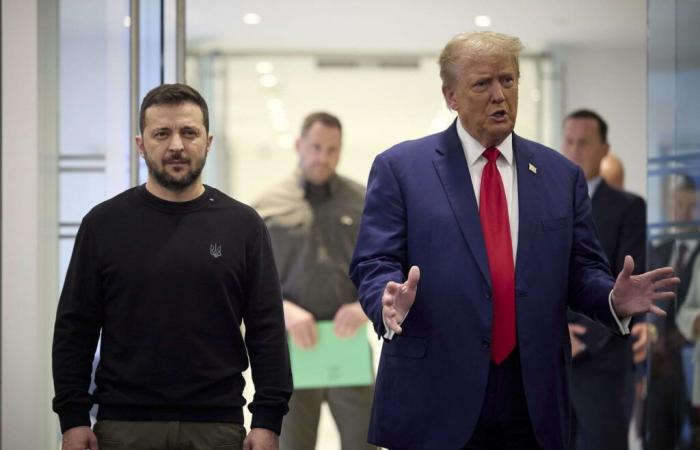Donald Trump has promised to end the war between Russia and Ukraine if he becomes president of the United States again. But given its positions and the few measures revealed, this does not seem to be good news for kyiv.
The war between Russia and Ukraine “would never have happened if I had been president” at the time of the invasion of Russian troops, declared Donald Trump during his inauguration as a candidate for the White House by the Republican Party, last July. He also said he was capable of putting an end to the conflict “with a phone call” and “in less than 24 hours” if he was elected. Now that he is assured of taking back the reins of the United States, after his victory in the presidential election on Wednesday, November 6, will he be able to match his words with actions? But above all, how could he go about putting an end to the war which has lasted for more than two years?
Donald Trump's policy towards the war in Ukraine raises many fears and doubts, starting with the future of American military and financial aid deliveries to kyiv. The billionaire and future president of the United States has always been critical of American support for Ukraine, to the point of putting pressure on Congress to refuse to increase aid allocated to the country from Eastern Europe. A position that still seems relevant today.
Several American analysts have estimated Washington Postbefore the result of the presidential election, that after a victory for Donald Trump “Ukraine's ability to fight would be greatly weakened”. According to them, the 47th President of the United States would not hesitate to reduce, or even suspend, American aid to kyiv.
Donald Trump's plan gives pride of place to Russia
If the future populist president has repeated his ability to end the war, he has always refused to reveal how he would do it. That's without counting on his vice-president, JD Vance, who outlined certain points of Donald Trump's plan in the Shawn Ryan Show podcast in September. Measures which, for many, meet the demands of Vladimir Putin and go against the positions of Ukrainian President Volodymyr Zelensky. However, for Europe as for the United States during the mandate of Joe Biden, peace must be obtained on Ukraine's conditions and not those of Russia.
Donald Trump's plan would be based on two major measures, the first being the creation of a “demilitarized zone” in Ukraine along the border with Russia, that is to say in the Russian-speaking territories annexed by Moscow. Such a device would amount to leaving the territories of Donbass and Crimea under Russian control, as wanted by Vladimir Putin. However, the Ukrainian president has for his part assured that there will be no negotiations until Ukraine has regained control of these lands so as not to arrive in a weak position at the negotiating table. The second point would consist of pushing Ukraine to renounce its entry into NATO or the European Union. Here again, the Trumpian plan meets the interests and wishes of the Kremlin while neglecting those of kyiv.
These statements by Donald Trump's running mate have been confirmed by several sources at Washington Post evoking discussions held during a meeting of right-wing American political leaders, including Michael Anton who is a former collaborator of the billionaire, and a delegation from the European Council on Foreign Relations. These people also specified another measure with regard to Moscow: that Russia relax its dependence on China, an economic competitor of the United States.
An admiration for Putin, an exchange with Zelensky
With the election of Donald Trump, Ukraine fears a disengagement from the United States in terms of military and economic aid. “The next American president could strengthen or weaken support for Ukraine. If this support weakens, Russia will seize more territory, which will prevent us from winning this war,” declared Volodymyr Zelensky on October 31 , during an interview with the audiovisual group KBS.
But the Ukrainian president wants to improve his relations with the future leader of the United States: he congratulated him after his victory and declared that he had never heard the Republican say that he did not want to help Ukraine. The two men then spoke by telephone and “agreed to maintain a close dialogue and to advance [leur] cooperation”, according to the Ukrainian president.
But if Donald Trump spoke with his Ukrainian counterpart, he always showed a certain admiration for Vladimir Putin and avoided being critical of the Kremlin and its dictatorial regime as reported by the Washington Post. A report to the Russian president which, combined with “his unprecedented hostility towards NATO”, “cannot give Europe or Ukraine any confidence in [les] relations [de Donald Trump] with Russia”, warned Tom Donilon, national security adviser under the presidency of Barack Obama to the American newspaper. And the man added that Donald Trump's position “represents a clear and present danger for the security of the United States and Europe.






